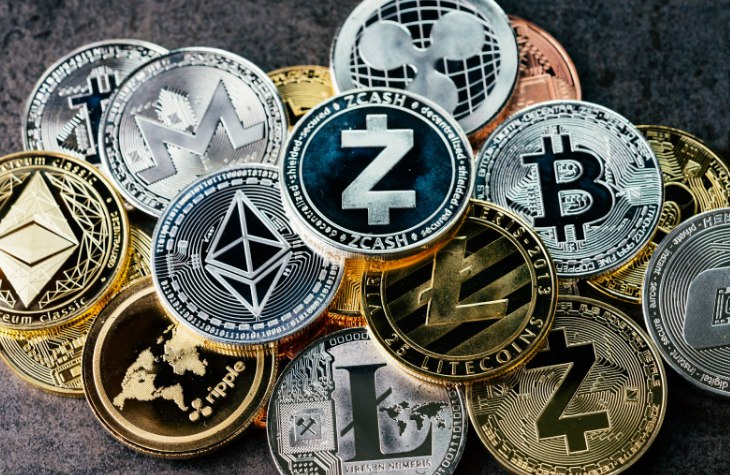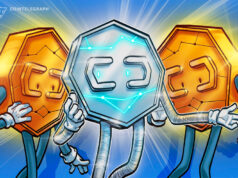
In 2023, several cryptocurrencies trading for under $1 are worth considering for investment. Many of these more affordable coins also present far high opportunities for growth as they have not yet undergone their expansionary phases. Investors need to move quickly. Here are eight of the top cryptocurrencies to buy for under $1:
DigiToads (TOADS) – The new P2E King
Cardano (ADA) – Cardano is a blockchain platform that uses a proof-of-stake algorithm to secure its network.
Stellar (XLM) – Stellar is a blockchain platform designed for cross-border payments and remittances.
VeChain (VET) – VeChain is a blockchain platform that focuses on supply chain management and anti-counterfeiting.
Basic Attention Token (BAT) – BAT is a cryptocurrency designed to be used in the Brave web browser. It rewards users for viewing ads and pays content creators for their work.
Holo (HOT) – Holo is a blockchain platform that focuses on decentralized hosting and applications.
Dogecoin (DOGE) – Dogecoin is a cryptocurrency that started as a joke but has since gained a large following.
Shiba Inu (SHIB) – A memecoin that aims to rival Dogecoin.
DigiToads (TOADS)
DigiToads is a new P2E game that allows players to earn passive income through NFT staking. DigiToads is a deflationary, memecoin cryptocurrency that has the potential for huge price increases, making it an attractive investment option. The token is tied to a platinum toad NFT, which has a limited supply of 5,000. Additionally, DigiToads has a charity and environmental aspect that appeals to socially responsible investors.
One of the standout features of DigiToads is NFT staking. Players can stake their NFTs and earn passive income in the form of DigiToads tokens. The game is designed to be enjoyable, and players can earn rewards while playing. The more NFTs staked, the higher the potential earnings.
The presale for DigiToads has already raised $350,000, indicating significant interest in the project. The ease of access to the presale is another key point, as many major coins are accepted as payment. The team behind DigiToads is doxxed, and there is no vesting period, ensuring transparency and trust.
DigiToads is a DeFi token, which means it is part of the decentralized finance ecosystem. Defi tokens have been gaining popularity due to their ability to offer financial services such as lending, borrowing, and staking without intermediaries. DigiToads is also a memecoin, which refers to cryptocurrencies that gain value based on their popularity and hype. Memecoins can experience rapid price increases, making them a popular investment option.
Overall, DigiToads offers a unique investment opportunity for those interested in DeFi, altcoins, and NFTs. The game’s passive income through NFT staking, deflationary nature, memecoin status, and charitable aspect makes it a promising investment option.
Cardano (ADA)
Cardano (ADA) is a decentralized proof-of-stake (PoS) blockchain designed to offer a more efficient alternative to proof-of-work (PoW) networks. Its development began in 2015, led by Ethereum co-founder Charles Hoskinson. Cardano’s internal cryptocurrency is named ADA, which can facilitate peer-to-peer transactions. Cardano aims to be a smart contract blockchain platform that allows users to interact with decentralized applications in a similar way to Ethereum and Solana. It seeks to deliver more advanced features than any protocol previously developed and is the first blockchain platform to evolve out of a scientific philosophy.
While some analysts predicted that ADA would exceed the one-dollar psychological mark and possibly continue to grow, it is not possible for ADA to be $100 in the short term of 1-2 years. However, some believe that it is possible in the long term of 10 years or more if it is mass-adopted by the world.
In conclusion, Cardano (ADA) is a decentralized PoS blockchain designed to be more efficient than PoW networks, and it seeks to deliver more advanced features than any protocol previously developed. Its internal cryptocurrency, ADA, can facilitate peer-to-peer transactions, and it aims to be a smart contract blockchain platform. It has the potential for growth in the long term if it is widely adopted.
Stellar (XLM)
Stellar (XLM) is a peer-to-peer, open-source virtual currency network that was established in 2015. The network was founded by Jed McCaleb, David Mazières, and Joyce Kim, with the aim of creating a decentralized payment technology system that enables cross-asset transfers. Stellar operates with a distributed ledger that updates all nodes every 2 to 5 seconds within the system, making it one of the most decentralized payment technology systems available.
Stellar Lumens (XLM) is the native asset of the Stellar ecosystem and play an essential role in denominating network requirements and transaction fees. Stellar allows anyone to issue new assets in the network and exchange them for other assets via built-in asset exchange features. Each account on the Stellar network is required to hold a small number of Lumens at all times.
Stellar’s mission is to enhance, rather than replace the existing financial system, by enabling people to transfer fiat currencies as digital money or crypto. The system allows users to send any currency and have the recipient receive another currency, making it an affordable and quick way to send money globally. Stellar is one of the top altcoins that has been around for several years and has established several partnerships and integrations with various organizations to expand its reach.
VeChain (VET)
VeChain (VET) is a blockchain platform designed to enhance supply chain management and business processes. The VeChain project aims to streamline information flow and processes for complex supply chains. VeChain is a decentralized network that caters precisely to the supply chain management industry’s needs, improving transparency and reducing transmission delays. The network uses blockchain technology to ensure the immutability and traceability of all transactions that take place on the platform.
VeChain aims to solve some of the fundamental problems in the supply chain management industry, such as the lack of transparency and the major data hurdles at every step of the supply process. The VeChain ecosystem has two native tokens: VeChain Token (VET) and VeThor Token (VTHO). The VET token is used to transfer value across VeChain’s network, while VTHO is used to pay for smart contract computations and transaction fees on the network.
The VeChain ecosystem offers tools to make supply chain management more transparent. By using blockchain technology, businesses and consumers alike can view and verify the history of a product, encouraging the reduction of carbon emissions. VeChain is an enterprise-focused supply chain and logistics blockchain solution with a long list of large partnerships.
In summary, VeChain is a secure and reliable blockchain technology that specializes in enterprise-grade solutions, while still capable of hosting a DeFi, DApp, and NFT ecosystem. It is highly scalable, secure, and has smart-contract capabilities, and users appreciate the low fees and passive income opportunities. The VeChain ecosystem is poised to revolutionize supply chain management by providing more transparency, efficiency, and security to businesses and consumers alike.
Basic Attention Token (BAT)
Basic Attention Token (BAT) is a utility token that was created as part of a new digital advertising platform known as Brave. The system tracks media consumers’ time and attention on websites using the Brave web browser, with its goal being to efficiently monetize users’ attention and protect their personal data and identities. The platform is built on the Ethereum blockchain and is an ERC20 utility token utilized as the unit of account for attention within the BAT platform.
BAT is a decentralised, open-source token with the objective of integrating it into other mainstream web browsers. The ecosystem works with BAT tokens, with advertisers transacting on one side of the exchange and publishers and users earning with BAT on the other. The cryptocurrency is designed to create a cycle of incentives around digital advertising for both creators and users. It aims to allow users to surf the web privately while also monetizing their attention, while publishers can recoup a good chunk of the revenue that was previously lost to bots and middlemen.
BAT is an ERC20 token built on Ethereum, created to solve and improve the user experience with digital advertising by developing a new blockchain-based model that actively blocks ads. Every Brave participant earns some BAT cryptocurrency, and it is an incentive for all users of the ecosystem. The cryptocurrency was created to generate and build user attention in the digital age. BAT has seen significant growth in recent years and is a promising project in the cryptocurrency world.
Holo (HOT)
Holo (HOT) is a decentralized cloud computing platform that uses blockchain technology to enable peer-to-peer hosting of distributed applications. It aims to provide a scalable, low-cost, and secure solution for developers to build and run decentralized applications. Holo is the underlying infrastructure for the Holochain framework, which is a fully distributed, agent-centric platform designed to enable decentralized applications to be built with ease. Holo uses a unique approach called “Holochain” to build scalable, distributed applications. Holochain is a more lightweight alternative to traditional blockchains that allows each user to have their own blockchain, enabling scalability while reducing the need for costly computing resources.
The Holo ecosystem has two native tokens: HoloFuel and HoloToken. HoloFuel is the accounting token that is used to facilitate transactions between hosts and app developers, while HoloToken is a utility token used to purchase hosting space on the Holo network. The Holo platform is built on open-source software and aims to provide a more decentralized and democratized approach to cloud computing, in which users have more control over their data and applications.
Holo has been gaining popularity in the blockchain space due to its unique approach to cloud computing and its potential to revolutionize the way we build and run decentralized applications. The project has received funding from various sources, including a successful initial coin offering in 2018 that raised over $20 million. The team behind Holo has also formed partnerships with other blockchain projects and has been actively working on expanding its ecosystem. As of March 2023, Holo has a market capitalization of over $1 billion and is traded on various cryptocurrency exchanges.
Dogecoin (DOGE)
Dogecoin (DOGE) is a decentralized, peer-to-peer digital currency that was created in 2013 by Billy Markus and Jackson Palmer as a parody of Bitcoin. The currency’s symbol is an image of a Shiba Inu dog, which originated from an internet meme. Dogecoin’s technology is derived mostly from Litecoin, and its Hash function (algorithm) is Scrypt based. The protocol is designed to be inflationary, with an unlimited supply of coins, and its block time is only one minute.
Although Dogecoin was created as a joke, it has gained a significant following, particularly on social media platforms like Reddit and Twitter, and has been used for various charitable causes. Some online retailers have also accepted the coin.
Dogecoin can be mined profitably with a Windows/Linux/Mac OS computer, one or more ASIC miners for Scrypt-based cryptocurrencies, power supplies for ASIC miners, and an account with a mining pool. The coin’s development team suggests the simplest and best use case for Dogecoin is tipping, which means spreading happiness over the internet.
Shiba Inu (SHIB)
Shiba Inu (SHIB) is a decentralized, community-driven cryptocurrency project that was created in August 2020 as a parody of Dogecoin (DOGE). Like DOGE, SHIB is a meme-inspired cryptocurrency that has gained significant traction in the crypto market. The project has three significant tokens, SHIB being the most important, while the others are Leash and Bone. SHIB allows users to hold billions or even trillions of it, and it has a large circulating supply of over 589 trillion SHIB coins.
Shiba Inu is characterized as a “meme coin” and a pump-and-dump scheme [5]. It aims to become a powerful layer-2 blockchain, and Shibarium will also allow users to launch genuine Shiba-branded physical products. SHIB has had significant price fluctuations, and its liquidity has grown over time. At its peak, SHIB was ranked in the top 10 cryptocurrencies by market cap but has since dropped to #14.
Recently, there has been news of a transaction in which bankrupt cryptocurrency lender Voyager transferred 250 billion SHIB tokens worth over $3.4 million to the Nasdaq-listed cryptocurrency exchange Coinbase, sparking speculation.
DigiToads Keeps On Climbing
DigiToads is a groundbreaking project that has gained rapid attention in the GameFi and crypto community. The amalgamation of its deflationary token, P2E platform, NFTs, NFT staking, and tremendous potential for substantial price increases make it an exceptional addition to the gaming world. It’s no wonder that it is regarded by many as the best presale. Do not overlook the chance to participate in this phenomenal project. Join the presale now and witness the thrill firsthand.


















































